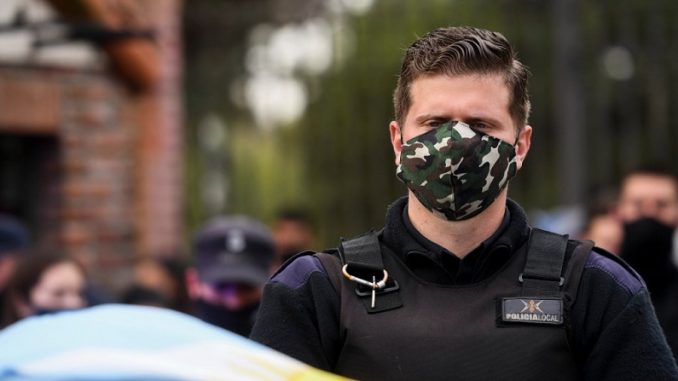
The yet unresolved conflict between sectors of the Buenos Aires Police, which a part of the provincial Penitentiary Service has subsequently joined, has opened a clear political crisis and expresses a particular combination of different elements. Installed in various places with their weapons and vehicles, they are even protesting at the Quinta de Olivos presidential residency itself.
What’s more: the official confirmation of a salary increase did not satisfy the troops, who demand to know the precise figure, to have a meeting with their boss Sergio Berni and other demands. The Buenos Aires cabinet chief, Carlos Bianco, confirmed that Berni maintains his office. Both announcements confirm that the repressive apparatus is a priority for the government, while maintaining starvation wages, layoffs and suspensions for the entire working class.
On the one hand, it is clear that their role in social control during the quarantine and the constant encouragement by the national government and especially Sergio Berni have emboldened this force, whose nature is repressive, like that of all police. The result of the continuous praise and harangues by the political power, plus the recent government announcement of a multimillion-dollar mega “security” plan for the Buenos Aires suburbs, has undoubtedly been to empower the largest police force in the country.
At the same time, this conflict is a new expression of the more general social decomposition that crosses the entire country. By breaking the verticality of its chain of command, including Berni and Governor Axel Kicillof, it effectively weakens its role as a repressive apparatus. And as an effect, the police demand for a 56% to 64% salary increase and the government´s immediate “yes” encourage worker´s anger and demands, especially of the public sector, whose salaries are greatly relegated. They should be the priority: the truly essential, such as health care workers who are on the front lines of the pandemic, teachers, transport workers, supermarket workers and other workers, who all deserve an immediate and substantial wage increase, as well as pensions and social plans.
In that sense, we repudiate the shamelessness of the right-wing political opposition. When Macrism held government in the province and in the country, it not only cut state salaries to “reduce public spending”, governed at the service of the IMF and dismantled public health and education, but also applied a whole series of repressive measures against social demands, the youth and the poor, with the Chocobar Doctrine as its banner.
At the same time, we do not believe that the police conflict today is putting at risk the validity of this limited “democracy´s” constitutional order, as some political sectors and pro-government trade unions proclaim in order to unconditionally defend the provincial and national Frente de Todos governments, who are politically responsible for this situation of crisis.
But along with the salary increase, democratizing the force and the right to unionize, the police list of claims includes point 14 against “reprisals:” citations, arrests, dismissals, transfers. We reject it outright, because it implies impunity for violence and other crimes in Buenos Aires. It is impossible to detach from this context the direct responsibility of the Buenos Aires Police in the forced disappearance followed by the death of Facundo Astudillo Castro, cases of police killings, police abuse and crimes of corruption.
Of course, the police claim does not raise a necessary point such as non-repression of social protests: workers’ struggles, land occupations, environmental marches, etc. In addition to Berni stepping down now, a real security policy would require not only the fight against social inequality as the basic cause of crime, but also the dissolution of this Buenos Aires Police and other police forces to build a new, totally different, democratic security organization, of a preventive, non-repressive character, with social participation and control, among other substantial measures.
Still lacking a clear perspective, the ongoing police conflict is another symptom of a more structural disease: the social crisis that is deepening day by day under this capitalist system and the unfeasibility of the IMF austerity plans and their repressive correlation to impose them. The real solution, thus, is to promote an economic and political project of the opposite sign, anti-imperialist, anti-capitalist and socialist, with the people´s welfare as its axis instead of the profits of the rich and corporations or the repression of working people.
September 9, 2020








